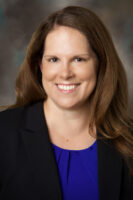The leaders of several education groups called on state superintendent Sherri Ybarra Wednesday to propose a big, bold public school budget for 2019-20.
About 20 people — representing more than a dozen different education, government and political groups — attended the budget priorities workshop at Ybarra’s State Department of Education.
Several key themes emerged, including fully funding the fifth year of teacher raises under the career ladder law, increasing funding for classified staff such as I.T. directors and providing districts and charters with money to pay for health insurance costs and school security enhancements.
Ybarra has boasted that the Legislature has approved a school funding increase of approximately $100 million or more each year she has been in office. This year, that translated to roughly a 6 percent increase. But education advocates asked her to dream bigger, since revenues are up and the state ended the 2017-18 budget year with more than $100 million in unanticipated money.

“We’d like to see a bold ask, not just a 5 percent increase or 6 percent,” Idaho Education Association President Kari Overall said. “Let’s go big. We’re doing well in our state with our taxes, and we’d like to see that investment in our schools.”
The Idaho Association of School Administrators backs funding for the career ladder and classified staff hires, and wants the state to spend more money to reward experienced teachers. But Executive Director Rob Winslow called for Ybarra to consider using any surplus or reserve accounts for a large, one-time budget to help schools pay for security upgrades.
“There is a big ask this year for safety and security issues, meaning that districts are looking at doing a lot of things, and a bump in one-time money is something they would love to have as they replace cameras and different systems,” Winslow said.
During Wednesday’s 45-minute meeting, several education advocates asked for Ybarra to push the Legislature to fully fund pay incentives for veteran teachers, a program called master educator premiums.
Overall said many teachers have been developing portfolios over the past three years in order to apply for the premiums. Overall said lawmakers should not cap the funding, and teachers who have put three years of work into the program should be honored and rewarded.
Education advocates stressed that schools should be held harmless as the state makes the transition to a new funding formula. Winslow said he hopes a new, student-based formula would come closer to covering districts and charters’ actual needs and costs.
Ybarra convened the budget meetings as a way to gauge priorities from the field as she and her staff ready their 2019-20 budget request, which is due to the state on Sept. 1. Ybarra has opened up the budget meetings to the news media for each of the past three years, and she releases an advance copy of her request shortly after submitting it to the state.
The 2019-20 budget request is likely to be closely watched. It could be the final budget approved under Idaho’s current school funding model. What’s more, a new governor will be in place next year, and the Legislature’s budget-writing Joint Finance-Appropriations Committee will have two new co-chairs. Ybarra is also up for re-election this year, and faces a challenge from Democratic nominee and veteran teacher Cindy Wilson — meaning a new superintendent could be in place for the 2019 legislative session.
Ybarra attended Wednesday’s budget meeting with several of her key staffers.
“I heard loud and clear the career ladder. I heard classified staff. I heard task force recommendations,” said Ybarra, summarizing the message she received Wednesday.
Those who attended Wednesday’s meeting included Winslow, Overall and Matt Compton from the IEA, Quinn Perry from the Idaho School Boards Association, Marilyn Whitney from retiring Gov. Butch Otter’s office, Idaho Digital Learning Academy Superintendent Cheryl Charlton, Tracie Bent and Mike Keckler from the State Board of Education and representatives from the charter school commission, Northwest Professional Educators Association, the Workforce Development Council and the office of Lt. Gov. Brad Little, the Republican nominee for governor.
